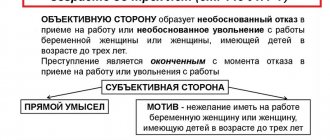Any legal entity has the right to enter into civil contracts with individuals. And despite the fact that state and municipal institutions must be guided by the legislation on the contract system, it can be impossible to do without such agreements. We have already talked about the differences between civil law contracts and labor contracts on the pages of our magazine. In this article, we will answer other questions that concern employers when concluding such contracts, in particular: for what kind of work can they be concluded, can they be concluded with employees of the organization or for the performance of duties provided for by regular positions?
When can civil contracts be concluded?
A civil contract (hereinafter referred to as the CLA) refers to transactions and is an agreement on the establishment, modification or termination of civil rights and obligations (Article 153, paragraph 1 of Article 154, paragraph 1 of Article 420 of the Civil Code of the Russian Federation).
The most common civil agreements concluded by organizations with individuals are contract agreements, paid services, and author's orders.
Under a contract, one party (contractor) undertakes to perform certain work on the instructions of the other party (customer) and deliver the result to the customer, and the customer undertakes to accept the result of the work and pay for it. A contract provides for the manufacture or processing (processing) of a thing or the performance of other work with the transfer of its result to the customer.
The contractor performs the work provided for in the contract, as a rule, personally, at the same time he has the right to involve other persons (subcontractors) in the fulfillment of his obligations. The customer is obliged, within the time frame and in the manner prescribed by the contract, with the participation of the contractor, to inspect and accept the work performed (its result), and if deviations from the contract are discovered that worsen the result of the work, or other shortcomings in the work, immediately report this to the contractor.
The contract establishes the volume and content of the work, the timing and place of its completion, the payment procedure, the price of the work to be performed or the methods for determining it.
A contract can be concluded for construction work, software product development, design work, household contracting, etc.
Based on the results of the work, a certificate of completion is drawn up and remuneration is paid under the contract (clause 1 of Article 702, clause 1 of Article 703, clause 705, clause 1 of Article 706, clause 708, 709, 711, clause 1, Article 720 of the Civil Code of the Russian Federation).
Under a contract for the provision of services for a fee, the contractor undertakes, on the instructions of the customer, to provide services (perform certain actions or carry out certain activities), and the customer undertakes to pay for these services within the time frame and in the manner specified in the contract. The general provisions on contracts (Articles 702 - 729 of the Civil Code of the Russian Federation) and provisions on household contracts (Articles 730 - 739 of the Civil Code of the Russian Federation) (clause 1 of Article 779, clause 1 of Article 781, Art. 783 of the Civil Code of the Russian Federation).
An employer may engage a consultant, lawyer, accountant, teacher, or translator under a services agreement.
Under an author's order agreement, one party (the author) undertakes, by order of the other party (the customer), to create a work of science, literature or art stipulated by the contract on a tangible medium or in another form. The material carrier of the work is transferred to the customer's ownership. The author's order agreement is paid. The work created under the contract must be transferred to the customer within the period established by the contract (clause 1 of Article 1288, clause 1 of Article 1289 of the Civil Code of the Russian Federation).
One of the basic rules that must be observed when concluding civil contracts is that the legislation of the Russian Federation allows the involvement of persons in work on the basis of civil contracts only in cases where these contracts do not actually regulate the labor relations between the employee and the employer , that is, individuals, according to the GPA, perform other paid work not provided for by the employment contract (Letter of the Ministry of Labor of the Russian Federation dated August 13, 2014 No. 17-3/B-383).
How a GPC agreement helps you save on mandatory payments
One of the most significant advantages of working under a GPC agreement is savings on taxes and insurance premiums. It is possible not only for the customer, but also in many cases for the contractor.
The calculation of mandatory payments primarily depends on the legal status of the performer, which can be:
- An individual.
- An individual entrepreneur (IP) on the simplified taxation system (STS) “income”. This is the most favorable regime for the provision of services in terms of tax burden.
- Self-employed, i.e. payer of professional income tax (PIT).
When concluding an employment contract, the employer must withhold personal income tax (NDFL) at a rate of 13% and charge insurance premiums on salary amounts at a rate of 30%.
Working under a GPC agreement with an individual (not an individual entrepreneur or self-employed) is more profitable, but not much. Personal income tax will be the same 13%, and savings on insurance premiums will be small: 27.1% instead of 30%.
If you conclude a GPC agreement with an entrepreneur using the simplified tax system “income”, then the customer should not accrue any mandatory payments. The entrepreneur himself will pay 6% “simplified” tax on the amount of income.
However, this poses an additional problem for the performer. All entrepreneurs must pay fixed insurance premiums “for themselves” for pension and health insurance. In 2021, these contributions are equal to 40,874 rubles plus 1% of income that exceeds 300,000 rubles.
Individual entrepreneurs without employees can fully deduct insurance premiums from the “simplified” tax. But in order to “cover” the fixed contribution and the additional 1%, the entrepreneur’s income must exceed 760,000 rubles per year or 63,300 rubles per month.
760,000 rubles x 6% = 45,600 rubles
40,874 rubles + (760,000 rubles - 300,000 rubles) x 1% = 45,474 rubles
With lower income, the individual entrepreneur will experience a significant tax burden. For example, with an income of 300,000 rubles per year (25,000 rubles per month), an individual entrepreneur will pay 13.6% to the funds, which is comparable to the personal income tax rate:
40,874 rubles / 300,000 rubles = 13.6%
If the contractor is registered as self-employed, then he will not have all the problems described.
In this case, the customer also does not pay any taxes. A self-employed person pays 6% of income when working with legal entities or individual entrepreneurs. And if the performer has recently registered as an NAP payer, then until he exhausts the bonus of 10,000 rubles, the rate will be even lower - 4%. There are no mandatory insurance contributions for self-employed people.
Example
The agreement between the customer and the contractor indicates the accrued amount of remuneration of 100,000 rubles. Let's consider what mandatory payments the parties to the contract will have to make under different options for cooperation.
Calculation of the tax burden when the contractor’s remuneration is 100,000 rubles. The annual income of an individual entrepreneur exceeds 760,000 rubles. The data in brackets is relevant for newly registered self-employed until the bonus is exhausted
Can an outsider keep military records in an organization?
Maintaining military records is mandatory for all organizations, regardless of their organizational and legal forms and forms of ownership. According to the Decree of the Government of the Russian Federation of November 27, 2006 No. 719 “On approval of the Regulations on military registration,” their leaders are responsible for the state of military registration carried out by organizations.
In an organization with less than 500 employees, military registration may be assigned to an employee working part-time. The person responsible for maintaining military records is appointed by order of the head. By virtue of the Methodological Recommendations for maintaining military records in organizations approved by the General Staff of the Armed Forces of the Russian Federation on July 11, 2017, the order is drawn up in the form in accordance with Appendix 4 to these methodological recommendations.
It is advisable for heads of organizations to coordinate with the military commissar of the municipality the candidacies of military registration workers before appointing them to positions, and also to send to the military commissar copies of orders on the appointment of employees carrying out military registration in organizations to positions.
Based on the foregoing, we believe that it is impossible to maintain military records according to the GPA and the employer must appoint a full-time employee for this or assign these responsibilities to the head of the organization.
Which contract option is most beneficial for the customer?
From the above, it is clear that the most profitable option for the customer is a GPC agreement with an individual entrepreneur or self-employed person, and best of all, with a “self-employed individual entrepreneur.”
The reason here is not only to save on taxes, but also to reduce other costs. Under the GPC agreement, the customer is not obliged to organize a workplace, provide equipment, materials, office equipment, etc. Also in this case, the customer has no obligation to make any payments for unworked time: sick leave, vacation pay, etc.
The paperwork is also simplified: when working under a GPC agreement, you do not need to fill out a work book, create a personal card, draw up a job description, etc.
The only disadvantage for the customer when using a GPC agreement is that he will have fewer opportunities to control the contractor. But this risk can be reduced if the contract provides for phased delivery of the work.
Is it possible to conclude a GPA to perform the work required by a vacant full-time position?
One of the cases when a GPA can be re-qualified as an employment contract is when an employee is hired for a specific position or profession (specialty) provided for in the organization’s staffing table. But it happens that a position is provided for in the staffing table, but it is not possible to find a suitable employee for it. And the solution in this situation may be to perform the work as a freelance worker registered under the GPA.
True, special attention should be paid to ensure that when providing such services, the contractor does not perceive signs of an employment relationship: submission to internal labor regulations, performance of services at a workplace created by the organization, receipt of a salary, etc.
Moreover, it is better if the performer does not perform all the duties provided for by the full-time position, or if the services provided differ from the duties provided for in the job description. Evidence of the absence of an employment relationship will also be the argument that the remuneration under the contract for the provision of services is more (or less) than the salary for the position, as well as that the contractor under the GPA during the provision of services did not contact the customer with an application (request) for hiring him for the corresponding vacant position.
What you need to remember about hiring employees under GPC agreements
- From the point of view of organizing work, a GPC agreement is much more convenient for a businessman than a labor agreement. The customer is not obliged to provide a social package, organize the performer’s workplace, or take care of the safety of working conditions. The parties can determine a convenient method of payment and acceptance of the work result. The GPC agreement should necessarily specify the conditions for its termination. It is impossible to terminate such an agreement unilaterally and in one day, unless this is specified in the conditions.
- To save as much as possible on taxes and contributions, you should enter into GPC agreements with individual entrepreneurs or self-employed people. This method is most beneficial for performers.
- When drawing up GPC contracts, it is necessary to take into account the risks associated with their possible retraining into labor contracts. It is better to enter into such an agreement for one-time projects or work, and you should not indicate conditions that could cause the reclassification of the GPC agreement into a labor agreement. For example, about providing the contractor with materials, about familiarizing him with the staffing schedule, the operating mode of the organization, etc.
Is it possible to conclude a GPA with a full-time employee of the institution?
A situation is possible when a full-time employee, simultaneously with his main job responsibilities, performs additional work on the GPA in the interests of the institution or works on the GPA while on annual paid leave.
Neither the Civil Code nor the Labor Code contains provisions prohibiting an employer and employee from entering into a GPA in the case where there is already an employment relationship between them. But the following condition must be observed: the work carried out under the GPA must differ from the duties of the employee, which he performs in accordance with the employment contract. If an employee, within the framework of the GPA, provides services that are in any way similar to his duties under the employment contract, then the relationship between the parties may be recognized as an employment relationship.
| Conditions for concluding a GPA with an employee of the organization | ||||||
| The work performed is not covered by the employment contract | There are no signs of an employment contract in a civil contract | Relations between employer and employee are regulated by civil law | Work is carried out during free time from work under an employment contract | |||
What is the threat to a business from re-qualifying a GPC agreement into a labor agreement and how to avoid it
A businessman who works with an individual entrepreneur or self-employed person saves 30% of his payroll costs. Naturally, employers often have a desire to reduce the tax burden on payroll as much as possible: transfer all or most of their full-time employees to the status of individual entrepreneurs or self-employed.
But tax officials are well aware of this scheme. Inspectors have the right, through the court, to re-qualify GPC contracts as labor contracts in accordance with Art. and 19.1 of the Labor Code of the Russian Federation.
If the court supports the tax authorities in this matter, then the businessman will have to withhold personal income tax from the entire remuneration of the executor and charge insurance premiums. In addition, all payments will be subject to a penalty at the rate of 40% and interest until full settlement.
Incorrect registration of relationships with employees is a violation of labor laws. Therefore, the businessman will be additionally fined under clause 4 of Art. 5.27 Code of Administrative Offenses of the Russian Federation. For individual entrepreneurs, the fine amount will be from 5,000 to 10,000 rubles, and for legal entities - from 50,000 to 100,000 rubles.
However, a controversial situation arises here. It is necessary to distinguish between an attempt to illegally optimize taxes and a completely justified conclusion of a GPC agreement for one-time or project work. This issue is not clarified in tax and labor legislation.
The Supreme Court of the Russian Federation has identified several criteria on the basis of which lower courts can decide that in fact there are labor relations between the parties to the contract (clause 17 of the resolution of the Plenum of the Armed Forces of the Russian Federation dated May 29, 2018 No. 15):
- the employer provides the employee with a workplace, equipment, and materials;
- the employee works in accordance with the general work rules established on the employer’s territory;
- the employer provides the employee with social guarantees: pays for vacations, sick leave, etc.;
- if an employee travels somewhere for work reasons, the employer will compensate him for travel expenses;
- the employee receives all or most of his income from that employer only.
In addition, when working with self-employed people there are additional restrictions. An employer does not have the right to enter into GPC agreements with its former employees who have become self-employed for two years (subclause 8, clause 2, article 6 of Law No. 402-FZ of November 27, 2018).
Formally, this requirement is easy to circumvent. You can open a new legal entity, and if a businessman already has a group of companies, then work with the self-employed through another group enterprise. But if, in fact, employment relations continue between the parties to the contract, then inspectors can easily prove this using the criteria listed above and charge additional taxes, fines and penalties.
Therefore, to avoid problems during verification, you should:
- Conclude GPC agreements only in cases where we are really talking about one-time or project work. For example, if an accountant processes primary documents on a daily basis in accordance with the labor regulations adopted by the customer, then there is a high risk that the GPC agreement with him will be recognized as an employment agreement. And if the company has entered into an agreement with the auditor for an annual audit of financial statements, which must be completed by a certain date, then there will be no risk of recharacterization of the agreement.
- Do not include provisions in the GPC agreement that may become the basis for its reclassification into a labor contract. In particular, taking into account the resolution of the Plenum of the RF Armed Forces No. 15.







